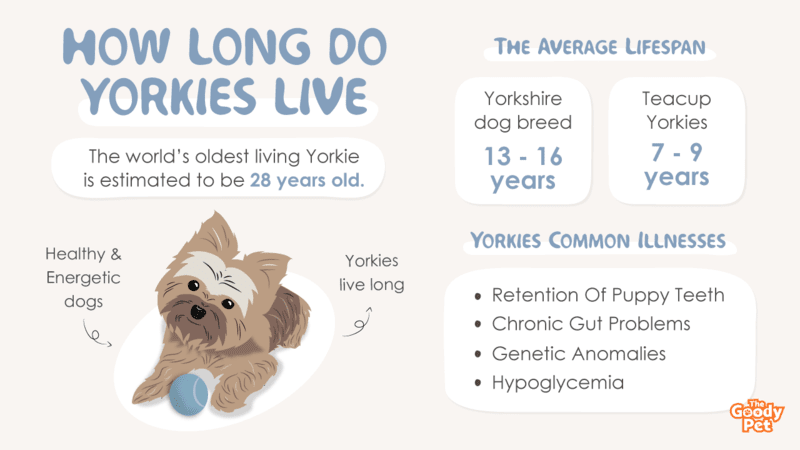Do you have a sweet little Yorkie at home? If so, then you might be worried about how long they live. You don’t need to worry, though, because it is not uncommon for Yorkies to reach 15 years old or even more!
On average, Yorkies can live around 13 to 16 years, but some can make it all the way up to 20 (or more)! In fact, the world’s oldest living Yorkie is estimated to be 28 years old.
However, the life expectancy of a Yorkshire terrier varies greatly depending on what factors may affect their health, such as genetics or lifestyle choices, such as diet and exercise. Yorkshire Terriers are susceptible to common dog health issues, especially the ones that commonly plague their breed, that can potentially lead to early deaths.
Before we take a look at some of these common health problems of Yorkshire Terriers, let’s examine the factors that may have contributed to their slightly longer life expectancy.
How Long Does A Yorkie Normally Live?

The average lifespan for the Yorkshire dog breed is 13 to 16 years.
This is impressive compared to other breeds – with averages as low as 5 to 8 years. There are, however, some differences in range within the breed. For example, female Yorkies, on average, outlive their male counterparts by about 1.5 years.
Generally, all breeds of Yorkies (such as the Biewer and Parti Yorkies) have this same life expectancy.
Teacup Yorkies on the other hand have an uncharacteristically low average for small breeds with a life span of 7 to 9 years.
One of the main reasons why Yorkies live so long for dogs is their general health status. These teddy bear-like pooches have been bred to near perfection over the centuries and are largely healthier than most other dogs out there. It doesn’t matter whether you have a pure pooch or a hybrid.
This does not mean that they don’t get sick or deteriorate with age. However, their problems are fewer and often easier to deal with. So if you take care of your little one properly, they will be around to bug you with their never-ending energy for a good long while.
In addition to the general good health Yorkies enjoy, they also benefit from the paradoxical relationship between dog breed sizes and lifespans. Typically in nature, larger species tend to survive longer. However, with dogs, it is the opposite, with small breeds outliving their larger counterparts with up to decades in lifespan difference.
The key theory proposed to explain this is the difference in metabolism and clearance of toxins. Small dog breeds, like Yorkies, have more efficient systems and therefore suffer less DNA deterioration and toxin accumulation.
What Health Problems Do Yorkies Have?

Yorkies live long, but their lives are not always problem-free, especially when it comes to wellness. While they are typically healthy and energetic, there are several health problems you may have to deal with.
You may have paid a low price for your Yorkie or even received one as a free gift, but chances are it came with some innate health problems.
Some of the illnesses are specific to Yorkies, while others are to be expected with most if not all small dog breeds. Here are 4 of the most common illnesses.
Retention Of Puppy Teeth
Dental problems are one of the most common health issues for Yorkies. Retained milk teeth can affect them greatly, as it leaves their gums sore and painful to chew.
This is where the puppy teeth fail to fall out. The growing adult teeth, therefore, have to fight for space in the tiny dog’s mouth. In addition to being uncomfortable and making eating a little annoying for the pooch, the problem is associated with dental cavities and should be handled promptly.
Chronic Gut Problems
Yorkies are typically very adventurous when it comes to what counts as food to them. Without proper training, the little furry buddies will make a meal out of anything, and this is the main cause of their gut problems, from ulcers to chronic diarrhea and vomiting. These problems are also common with aging Yorkies due to deteriorating gut health.
Genetic Anomalies
Yorkshire dogs also suffer from a range of genetic anomalies. These range from abnormal eyelash positions and skeletal malformation to hormonal abnormalities, like Cushing’s syndrome.
These tamper with the overall quality of life of the Yorkie, like causing it to stink or have some mood swings. If left unchecked, they could lower their survival rate.
Hypoglycemia
Hypoglycemia is a very common problem among small breeds, especially Yorkies. These little ones love to play and are constantly off somewhere exploring or getting into trouble.
If their calorie intake does not match their active lifestyle and feisty personalities, there is always a risk of hypoglycemia. This is when the blood sugar levels are lower than what is required to keep them healthy and functioning.
It could present as something simple as lethargy or serious complications, including hypoglycemic comas.
A common indicator of lethargy is a less enthusiastic wagging of the tail. If your Yorkie did not have its tail docked, you could use its tails’ activity as an indicator. If not, as Yorkies like to bark, the frequency of barking can be a good substitute.
What Do Yorkies Usually Die From?
What is unique about Yorkies, in general, is that for the most part, diseases that afflict them most of their lives contribute only a small portion to the main causes of their death. There are 3 main causes of death most of which are associated with old age in Yorkies. In addition to complications from the aforementioned illnesses, this is what Yorkies usually die from:
Cancer
Cancers that commonly afflict Yorkies include lymphomas, skin cancers, bone cancers, and mammary tumors. The problem is that they are often caught late, resulting in high mortality. Despite being one of the leading causes, it happens to be one of the easiest to prevent, with studies proving high effectiveness in reducing risk by spaying.
Trauma

Yorkies may be small, but when they fall, they fall hard. The problem is that they are not the most agile of breeds, so if you drop them or they run into hard surfaces, their reflexes are not always fast enough to avoid injuries. It could also be other accidents, including accidental trampling or getting run over. Whatever the case, head injuries are the main causes of death with trauma.
Respiratory Deterioration
This has for a long time been the leading cause of death not only among Yorkies but many popular small dog breeds. It is an unpredictable and often inevitable consequence of age. Fibrosis of the lungs and tracheal collapse is the most common issues among Yorkies in this case. In addition to making breathing difficult, they make the little one more prone to respiratory infections, which ultimately lead to death.
How Do I Know If My Yorkie Is Dying?
Unfortunately, dogs can’t talk to us and tell us when and where it hurts. This means that, for the most part, our furry besties suffer for a long time in silence before their agony is evident enough for us to pick up on. However, there are certain clues that could help you figure out when something is wrong so you can take prompt action.
Eating Habits

Yorkies are usually ravenous little beasts that will eat anything they deem tasty.
So if your little one starts leaving their food bowl empty, you need to be alarmed.
Poor appetite is the most common universal symptom and could be a result of anything from a stomach bug to illness-related lethargy.
Activity Level
The level of activity is something else you could keep an eye on.
If your usually active Yorkie is all of a sudden super chill and constantly tired, then something could be wrong.
Try giving them their favorite dog treat to eat and see if the situation changes. If its activity level improves, this behavior is likely due to hypoglycemia.
If it does not work and they still feel lethargic, you need to get the little one checked out in case it becomes a more serious problem.
Appearance
Yorkies have very sensitive skin and coats. More often than not, problems with internal systems present with altered coat appearance. This could be in the form of rashes or even hair loss. In skin conditions like cancer, you may also notice lesions like abnormal growths or ulceration.
Bowel Movements
Finally, your doggy’s bowel movements serve as a major clue for a sick and/or dying Yorkie. Here, look out for the frequency of movements, their consistency, and the presence of things like blood, mucous, or worms. Excessive diarrhea and vomiting are common, potentially life-threatening complications of many Yorkie illnesses and should therefore never be ignored.
How Can I Keep My Yorkie Healthy?
Yorkies are generally very easy to maintain when it comes to health and overall well-being. To help you out, here are five tips to help your little one live to its entire lifespan potential.
#1: Establish A Yorkie-Friendly Meal Plan
This includes feeding them foods that have been proven to be safe and beneficial to them. So make an effort to learn foods that should be particularly avoided with Yorkies and dogs in general. It also means feeding them in regular intervals and quantities to prevent issues like obesity or hypoglycemia.
#2: Get Them The Exercise They Need
This is important for musculoskeletal health, maintaining a healthy metabolism, and the general well-being of the pooch. It is particularly important with this breed as they are prone to muscle and joint problems, which in turn lead to complications like obesity. So get ahead of this problem and make life easier for your pooch with that occasional walk or backyard playtime.
#3: Make Vet Visits Routine
This should go without saying, not only for Yorkshire dogs but any breed you may have. Make a habit of investing in your furry friend’s health by taking them to the doctor regularly. This means they keep up with their shots and deworming, as well as picking up on any early signs of severe conditions.
#4: Proper House Training
Something as simple as training could save you and your dog a lot of anguish down the line. Discipline training will help prevent things like trauma, whether it is from running into the street or falling down the stairs.
It also includes training on what they can and can’t eat to spare them upset tummies, as well as potty training to maintain proper hygiene. Ideally, these dog training should start young when it is easier for them to learn and for you to train.
#5: Try Health Supplements
No matter how good the dog brand you settle for is, your Yorkie could always benefit from additional supplements. These provide additional nutrients and compounds needed for the pooch to thrive.
A fantastic option is Doggie Dailies Glucosamine for Dogs. The soft chewable contains vitamins, minerals, and compounds like glucosamine that are ideal for protecting your Yorkie from bone and joint-related health problems such as hypoplasia of dens, Legg–Calvé–Perthes syndrome, and luxating patellas.
Another great supplement to try is TOMLYN High Calorie-Nutritional Gel. This is a high-calorie ideal for picky eaters or dogs with poor appetite. With a small squeeze of this every now and then, you can protect your four-legged bestie from hypoglycemia.
Related Questions
Longest Living Yorkie: The longest living Yorkie in recorded history was a male pooch from Britain known as Jack. He lived up to 26 years which is an entire decade above the expected lifespan. Despite the numerous health problems from arthritis to incontinence, it was a fatal attack from a terrier that ended this little one’s long life.
How Long Do Yorkies Sleep? Yorkies generally do three things all their lives. Eat, play, and sleep. And with how much playing they do, it is no wonder that they are always tuckered out. In fact, Yorkshire Terriers have one of the longest sleeping cycles, with a daily average of 15 to 20 hours of sleep.
Why Do Yorkies Shake? Yorkies shake for two main groups of reasons. The first is psychological, in which the tremors are a result of anxiety. It could be social anxiety in unfamiliar places or separation anxiety when the owner leaves them. The second possible set of reasons are physical. The leading cause here is hypoglycemia, but it could also be due to seizure disorders.





